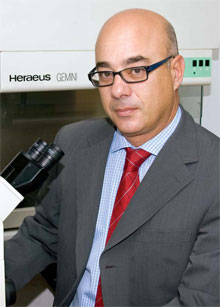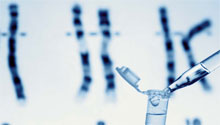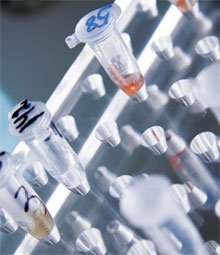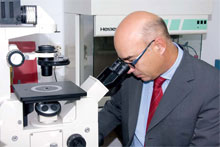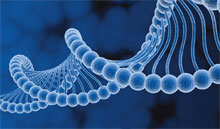Dr. Luis Izquierdo: Researcher and doctor specialized in geneticsMISCELLANEOUS
Luis Izquierdo López was born in Madrid in 1961.
Following the family tradition, he studied medicine at the Complutense University in Madrid, where he took his doctorate. After this, he moved to Glasgow (UK) to take his Masters in medical genetics.
After returning to Spain, he has worked as a researcher at the Clinical Hospital sponsored by the Health Research Fund (FIS). He has been a professor at the European University of Madrid and since 2000, has been working in his laboratory in the Genetic Research Center (C.I.G.). This center was founded by his father, a doctor specializing in gynecology and genetics in the department headed by Professor Botella, who pioneered the development of cariotypes in Spain during the 1960s (cariotypes are a method of mapping the chromosomes of a cell arranged according to its morphology).
"We still have to learn about the structure of many genes" Genes are the basic units of heredity. They carry the genetic information needed to synthesize proteins - the chemical compounds whose function is to regulate all the processes in the human body. Researchers have been decoding the information contained in genes over recent decades, enabling them to use genetic tests to assess the likelihood that an individual will contract certain diseases during his or her lifetime. Genetic research is enjoying its heyday, despite the ethical problems that it is generating. Thanks to the decoding of the Human Genome in 2003, there is enormous scope for the future of medical genetics as regards research into diseases and prevention based on the application of personalized solutions.
How would you define medical genetics?
It is the area of medicine that focuses on the
diagnosis of hereditary diseases. Victor McKusick,
the American professor of medicine who
is our doyen, said that just as the kidney is the
organ of reference for nephrologists and the
heart occupies the same position for cardiologists,
the field where medical geneticists
“operate” is the Human Genome. McKusick and
his collaborators laid the foundations for this
specialism in the 1940s and 1950s. McKusick
died a short time ago, but it was he who brought
together the entire extant body of scientific and
medical knowledge on this subject at a certain
moment in time.
Since you completed your doctoral studies in
medicine in 1986, what changes have you seen
in the field of genetics?
Every kind of change. In fact, this has been an
excellent period to observe the transformations
that have taken place. We have witnessed a total
revolution as regards DNA (the English abbreviation
for deoxyribonucleic acid, known as ADN
in Spanish, which is the primary substance in
chromosomes and genes). I was in Barcelona
in 1986 when genetic research was already under
way into Duchenne (a type of muscular dystrophy).
There is also another disease known as
fragile X syndrome (FXS), which causes mental
retardation. And at the end of the 1980s, in
connection with yet another disease -spinal
muscular atrophy- I contacted the researcher
who had discovered the mutation gene because
I had a family to whom I had to give a diagnosis.
I have always worked in this ill-defined border
area between research and clinical application.
Another very interesting event that I experienced
was the discovery of the breast cancer gene.
There was a geneticist in New York, Marie Claire
King, who was studying several families where
it was shown that breast cancer was hereditary, but nobody believed her - until a congress in the
1990s when she managed to prove that it was
indeed hereditary, and is in fact one of the most
frequent of all hereditary diseases.
In a genetic heredity profile, is the function
programmed in a particular gene bound to
trigger, or are there external factors that can
prevent this from happening?
No, it is not bound to trigger. There are many
external influencing factors that are still unknown
to us. Take breast cancer, for example. What is
strange is that women who carry the same anomaly
in one of the genes that are known to
produce breast cancer are not certain to get the
disease. If such women live to the age of 70, 80
per cent of them will contract breast or ovarian
cancer. But that figure is for the population in
America, where the incidence of breast cancer
is higher. When this research was carried out in
Spain, which has a lower incidence of breast
cancer than the Anglo-Saxon countries (due to
the influence of diet and environmental conditions),
women carrying this same mutation proved
to be less likely to develop the disease.
Instead of 80 per cent, the rate of occurrence
drops to 60 or 50 per cent. It's clear that there
are other factors which influence the development
of the disease.
Spanish women have a lower incidence of breast cancer than women in Anglo- Saxon countries due to the influence of diet and environmental conditions
In 1969, 300 genetic diseases had been described
and 6,000 had been identified by the end of 2000.
Is the number continuing to increase at this pace?
It is continuing to rise, but more slowly. Let's say
that development peaked during those years. There
are two important factors in the progress of genetics,
or in our knowledge of the genes that are
responsible for diseases: one is the technology of
DNA, which was essentially revolutionized by the
polymerase chain reaction or PCR, a fundamental
process in molecular biology. This is a method
whereby you can obtain hundreds of thousands of
copies from one fragment of genetic material. It
is like cloning a fragment of DNA. This has been
a key element in the search for genes that transmit
diseases, making it possible to sequence and
complete the Human Genome, which is the combination
of genes that characterizes our species.
The other factor is the computer. This research
would have been impossible without computers
or information technology. Over this period, the
advance of computer technology and the development of PCR, which emerged in the mid-1980s,
were the factors that made it possible to discover
many of the genes that are related to diseases.
What are the applications for medical genetics?
Basically, the diagnosis and prevention of hereditary
diseases.
The applications for medical genetics are basically, the diagnosis and prevention of hereditary diseases
¿And is it possible to intervene before the
symptoms appear?
No. But in terms of prevention, it is sometimes
possible to take action so that the patient does
not suffer with the disease. For instance, if you
make a diagnosis before the appearance of
symptoms of hemochromatosis, which is one of
the most frequent hereditary diseases, you can
prevent the person from suffering the consequences
of the disease by administering a simple
treatment throughout their lifetime.
Who has an interest in knowing an individual's
genetic profile?
First and foremost, other doctors who specialize
their own fields. Cardiologists want this information
to detect heart rhythm disorders; it helps
pediatricians to identify malformation problems;
neurologists can utilize it to confirm neurological
diseases that they detect, and it is also helpful
to oncologists if they suspect the presence of
hereditary cancer. All these groups send us
patients according to their specialist areas.
Genetics is a very transparent science and there are no problems to obtain data on the incidence of diseases or their prevalence in certain groups among the population
What interest does the insurance industry have
in this field?
It is a way of diagnosing and preventing diseases.
That is the key fact.
Is there any kind of restriction on the use of
genetic data or information by insurers?
The new (Spanish) Law on Assisted Reproduction
passed in 2006 refers to the confidentiality of
genetic data. It states that this data regarding
clinical history is confidential, and is the property
of the patient; so in that respect, it does not
differ greatly from other data. This means that
patients can forward this data to an insurance
company or to anyone else they like.
Can insurers request a genetic test at a specific
time?
That could happen, but such tests are not carried
out at present.
Genetic science isn't very popular. It can provide
information, but maybe it won't produce a specific
cure.
This is something that happens quite often:
people expect genetics to provide more than it
can really deliver at present. Of course, there
are some diseases that we can cure or prevent:
hemochromatosis is one example. But in fact,
society expects far more than what can be delivered
in reality. There are some things that we
can do, such as taking preventive action - but
we cannot reverse the action of a gene in an
individual. It is impossible to block the expression
of a gene that is causing a disease in someone;
once we have achieved that, we shall definitely
be able to cure cancer.
There are drugs specifically designed for genetic anomalies which could cost as much as EUR 60,000 per week
The Human Genome -or the total number of
chromosomes in the body- was decoded in
2003. What was the significance of that?
It was a fundamental factor in a very large number
of fields relating to the diagnosis of diseases.
What still remains to be done?
We need to learn about the structure of many
genes, how they behave, and so on. Many genes
act as regulators of other genes. We still need
to discover how they are interrelated, and to
identify the functions of certain fragments that
have already been sequenced. But this work has
had some important implications. In the field of
pharmacogenetics, for instance, it is known that
everyone has their own individual susceptibility
to the action of a particular drug, and this will
lead to individualized medicine in the near future.
There is no reason for one psychiatric patient
who is taking an anti-depressive treatment to
receive the same dose as another patient with
a different genetic profile.
What is the international scope of genetic research
as it applies to the insurance sector,
given that insurers need information which
they can theoretically use to select their clients?
The recent development of medical genetics
as a whole, and of the entire body of knowledge
regarding genetics, has taken place in the
middle of the Internet era. This has made it
one of the most transparent branches of science
and one whose consequences for the general
public are easier to identify. Work on hereditary
diseases or genetic features is being published
everywhere. For example, there is a venture
called “The Code Genetics” which set out to
log the genetic variants for the entire population
of Iceland. This is supplying a great deal of
information about genetic variants that may
cause a predisposition for this or that disease.
All of this material has been published. I repeat:
genetics is a very transparent science in this
regard, and there are no problems when it
comes to obtaining data on the incidence of
diseases or their prevalence in certain groups
among the population.
What advances shall we witness in genetic
research over the coming decades?
Essentially, we shall see the development of
drugs that aim to control the expression of genes,
or to block genes that are causing a disease.
Will it be possible to control the ageing gene?
Is it true that we are genetically programmed
to live for 120 years?
Firstly, let's hope that we will be able to control
more diseases, including leukemia. There is not
one single ageing gene - several different ones
are involved. And yes, it is true that life expectancy
is continuing to increase. Before antibiotics appeared
on the scene, the highest mortality rates were
for infectious diseases. After the arrival of antibiotics,
mortality due to infectious diseases decreased
but there was an increase in mortality caused by
other diseases which where unknown until then
because people had not experienced them sufficiently.
It is possible that we are programmed.
Are treatments in connection with medical
genetics very expensive? Might they only be
available to the elite?
Yes, they are very expensive. In Spain, they are
available to everyone thanks to the public health
system, but whether this system can afford the
treatments is another question. For example,
there are drugs specifically designed for genetic
anomalies which could cost as much as EUR
60,000 per week.
Is Spain especially prominent in any particular
field of genetic research?
The National Center for Oncological Research
(CNIO) is giving an enormous boost to genetic
research applied to oncology. There have always
been universities focusing on this field, geneticists
with sufficient interest in it, and good results.
More so in Barcelona than Madrid.
Is the USA still the country of reference as
regards genetic research?
Yes. That is basically because it allocates far
more money from its budget to research than
has been possible elsewhere, and this has enabled
the USA to make more progress in diagnostic
procedure as well as drugs.
Nowadays, with globalization, how long does
it take to get a new treatment? A matter of days
or hours?
But it does take time. Being treated by the
person who has developed a drug is not the
same as treatment by someone who has to
learn how to do it. For 99 per cent of diseases
or tumors, it is not worth the trouble of going
to look for a treatment, but it is still worthwhile
in 1 per cent of cases; basically because the
USA is a country that invests far more in research
than the entire European Union. At the
end of the day, the results of this are visible.
There is a reason why the best researchers and
doctors go there.
How are these activities regulated in Spain?
There is no specialist field of medical genetics.
Is there a professional association?
Yes, there are various associations, and many people devote their efforts
to this aspect, but the problem is that there is no training program. There
are various societies such as the Spanish Association of Human Genetics
(AEGH), and (within it) the Association of Medical Genetics (AGM). Then there
are two associations within the Spanish Pediatric Society (SEP), which also
has a medical genetics section. And there is a prenatal diagnostics section
within the Spanish Gynecological and Obstetrics Society (SEGO).
Do all the professionals who practice or research here know one another?
Plenty of them do. But the main problem is that Spain has no officially
regulated training in medical genetics, whereas studies in this field are
recognized by many countries in the European Union. I think that this is
the case in virtually all of them, including Portugal.
